Posts Tagged ‘“product liability”’
Honda Motor Co. Fined $70 Million for Failure to Report Injuries and Deaths
 Last week we learned the National Highway Traffic Safety Administration (NHTSA) issued Honda Motor Co. two safety fines totaling $70 million. The fines were announced last week but had been issued before the New Year. These are the largest penalties the NHTSA could impose. With them, automakers finish the year paying $126 million in civil penalties, the most ever for one year. The amount also exceeds the total amount collected in all 43 years of the NHTSA’s operation.
Last week we learned the National Highway Traffic Safety Administration (NHTSA) issued Honda Motor Co. two safety fines totaling $70 million. The fines were announced last week but had been issued before the New Year. These are the largest penalties the NHTSA could impose. With them, automakers finish the year paying $126 million in civil penalties, the most ever for one year. The amount also exceeds the total amount collected in all 43 years of the NHTSA’s operation.
Honda’s Fines
- Honda was fined $35 million for failure to report submit early warning reports (EWR reports) identifying potential or actually safety issues. The company failed to report 1,729 death and injury claims between 2003 and 2014.
- Honda was fined a second $35 million for failure to report certain warranty claims and claims related to its customer satisfaction campaigns, in which a manufacturer quietly agrees to fix defects on cars even beyond the normal warranty period.
Honda was ordered to submit injury reports as part of the NHTSA’s investigation on defective Takata airbags last year. Some of the drivers who died as a result of the Takata airbag defects were driving Honda vehicles. The airbag defects are linked to at least five deaths and dozens of injuries in the U.S. Automakers have recalled nearly 14 million cars with these airbags worldwide. Takata, a Japanese company, has limited its recalls to Florida, Hawaii and other warm weather states, despite pressure from the NHTSA to expand the recall nationwide.
Other Companies Which Were Fined
Among the companies the NHTSA fined last year: Gwinnett Place Nissan, Ferrari S.p.A. and Ferrari North America, Chapman Chevrolet LLC, Hyundai Motor America, General Motors Company and Prevost and Southern Honda Powersports.
Then of course there was General Motors, which was fined $35 million for how it handled a recall of more than 2 million vehicles with ignition switch problems. It also paid a separate $441,000 fine for failure to fully respond to a special order by a specified due date.
Toyota is not on the list of companies which paid civil penalties in 2014. But it paid the U.S. government a $1.2 billion criminal fine for it actions during a safety investigation.
Proposed Safety Changes for 2015
In the New Year, the U.S. Department of Transportation and NHTSA are proposing to increase the maximum fine for auto safety violations from $35 million to $300 million. The agencies also want the NHTSA to have additional authority to compel companies to recall unsafe products.
Related:
U.S. Department of Transportation Fines Honda $70 Million for Failing to Comply with Laws That Safeguard the Public, National Highway Traffic Safety Administration.
Read More
Shop Carefully for Strollers, Car Seats and Holiday Gifts for Families
 Ready or not, the holiday shopping season begins in earnest this week. Enjoy shopping for loved ones, but remember to buy with caution, especially when selecting toys and products used by young children. The Consumer Product Safety Commission (CPSC) recalled millions of unsafe toys this year, and also many of the most basic children’s products, including car seats, strollers and furniture. Shoppers should closely examine every purchase. Here are a few holiday shopping tips:
Ready or not, the holiday shopping season begins in earnest this week. Enjoy shopping for loved ones, but remember to buy with caution, especially when selecting toys and products used by young children. The Consumer Product Safety Commission (CPSC) recalled millions of unsafe toys this year, and also many of the most basic children’s products, including car seats, strollers and furniture. Shoppers should closely examine every purchase. Here are a few holiday shopping tips:
Check for recalls. Search the CPSC database to see if a specific product has been recalled. You can also search by company.
Here are some of the important ones to remember:
Graco Recalls. Graco recalled millions of car seats earlier this year because of sticky-buckles which were trapping children in the seats. Just last week, it also recalled 4.7 million defective strollers which can cause finger amputation. Graco recalled the 11 stroller models after 10 fingertip amputations and one finger laceration. The strollers were sold from 2010 until earlier this month at a number of retailers, including Target, Toys R Us, Walmart, Amazon.com and Walmart.com. Read the recall notice.
Furniture Recalls. Common home furniture also caused child injuries this year. In August, Ace Bayou recalled 2.2 million bean bag chairs after two children unzipped them, crawled inside and suffocated to death. Anyone with one of these defective chairs should call the company for a repair kit to disable the zipper.
Another serious recall impacted in Massachusetts. Earlier in the year, Lane furniture renewed its recall of wooden cedar chests after two children in Franklin became trapped in one and suffocated. The children had apparently been playing hide-and-seek and became locked inside. The company first recalled the chests in 1996, but millions of the defective chests are believed to still be in use without the necessary repair.
In the Massachusetts case, the children’s family is believed to have bought the used chest at a second-hand store more than a decade ago. Second-hand sales are challenging to regulate, as are families and friends who pass along used products to each other. This makes it important to know the characteristics of an unsafe product as well as specific products which have been recalled.
Buy age-appropriate. Read the age recommendation on toys and children’s products. Consider a child’s family. If you are buying for a child with younger siblings, buy something which is safe for all ages in the household.
Be careful buying online. After a product is recalled, it is against the law to sell it in stores or online. But some auction and online listing websites do not police private sellers closely. Avoid these sites when holiday shopping for children.
If you purchase through a merchant website such as Amazon.com, make sure you receive the right product and that it has the same age appropriate label and pieces as shown online.
Beware of suffocation and choking hazards. Avoid balloons, marbles and toys with small pieces which children can put in their mouth. Also avoid small magnets. Remember these things come with many toys, but they also come from other gifts and products that enter a home. For instance, the magnet desk sets which were so popular many years ago for adults turned out to be extremely dangerous for children. In some cases with the Buckyball magnet sets (which have been recalled), children found small magnets years after families brought the set into their home in hard-to-reach places, such as under a couch. Our point is: Please consider every gift carefully.
Read More
Check Your Car’s Airbags After Recalls Linked to Four Deaths, Injuries
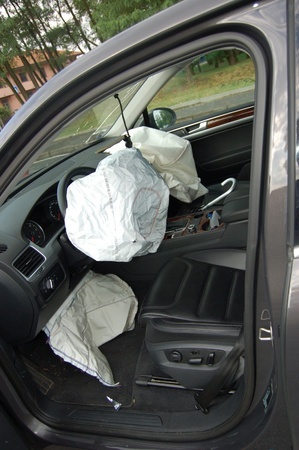 Last week, the National Highway Traffic Safety Administration (NHTSA) issued an advisory urging the public to act immediately on recall notices impacting 7.8 million cars with Takata airbags. The airbags are now linked to four deaths and more than 100 injuries.
Last week, the National Highway Traffic Safety Administration (NHTSA) issued an advisory urging the public to act immediately on recall notices impacting 7.8 million cars with Takata airbags. The airbags are now linked to four deaths and more than 100 injuries.
If you have not already done so, please immediately check if your vehicle’s airbags have been recalled. Visit Safercar.gov. Select your auto manufacturer and enter your vehicle identification number, or VIN.
While car manufacturers are required to notify owners of recalls, do not wait to receive a letter for the company. While many of the airbags were previously recalled, you may have missed an earlier letter or may not have appreciated how serious the recall actually is.
The recalls involve Toyota, Honda, Mazda, BMW, Nissan, Mitsubishi, Subaru, Chrysler, Ford and General Motors. More than 5 million of the cars are Honda models. Many are older vehicles from the 2000-2007 model years.
After you check the site and contact your dealer, be prepared to wait. Unfortunately, many dealers do not have the parts they need to meet demand.
Prior to last week’s announcement, 2014 was already the worst year ever for auto recalls, with 50 million vehicles recalled. One in five cars in our country has a defect. General Motors (GM) paid a $35 million fine last spring and has recalled 26 million vehicles.
Why are the airbags defective?
These airbags have inflator mechanisms which can rupture and explode, sending metal and plastic shrapnel at drivers and passengers. They use excessive force. Police were investigating the death of a woman who had been in a car accident as a homicide because she appeared to have stab wounds on her neck. Then her relatives received a letter about the airbag recall to her from home from her car manufacturer. See The New York Times article, “It Looked Like a Stabbing, but Takata’s AirBag Was the Killer.”
How long will it take to get a replacement part?
It is hard to say. Some dealers already have the replacement parts ready, but others are on back order. Some car manufacturers are warning car owners not to carry front-seat passengers until the airbag defect is fixed. Toyota is telling dealers to shut the passenger seat airbags off in all vehicles that are brought in until new parts are available.
Can I get alternate transportation?
Probably not. It is unfortunate, but most of us will have to wait for the new parts to arrive. Your local dealer may also offer you a trade-in.
I did not buy my car from a dealer. I bought it from a private party.
Check your paper work from your car’s sale for the name of the dealer who originally sold the vehicle. If you cannot find this, contact any local dealer of your vehicle and ask them to assist you.
Should I purchase a car under recall?
Unless the specified repair has been made, a dealer is not allowed to sell you a car under recall and you should never purchase one under recall from a private party either.
When you are looking to buy a car, write down the model and year, then search for it online at SaferCar.gov or the Consumer Reports Recall database.
I was planning to sell my car.
You should wait for any serious defect to be repaired before selling your car. This is the safest and most ethical option regardless of the law. But there are laws to consider, including the Massachusetts Used Vehicle Warranty Law, which states private party sellers have to disclose defects to buyers.
About Breakstone, White & Gluck
The Boston product liability lawyers at Breakstone, White & Gluck have over 100 years combined experience representing clients injured by negligence in Massachusetts. If you have been injured, learn your rights. For a free legal consultation, contact us at 800-379-1244 or 617-723-7676 or use our form.
Toyota, GM and Mazda Make New Headlines for Safety Recalls
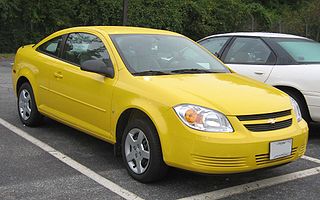 Toyota issues its second largest safety recall ever while GM CEO addresses Congress and Mazda reports a new web of problems
Toyota issues its second largest safety recall ever while GM CEO addresses Congress and Mazda reports a new web of problems
Toyota has more bad news for drivers. Just a few weeks ago, Toyota agreed to pay a record $1.2 billion criminal penalty to the federal government. The Japanese automaker, which has recalled over 9 million vehicles worldwide in recent years, recalled another 6.4 million vehicles on Wednesday for steering, airbag and other safety defects. This is the company’s second largest single recall announcement. Toyota states that it is not aware of any crashes or injuries involving these defects.
In March, Toyota agreed to pay the $1.2 billion criminal penalty to federal government for misleading consumers and the government about unintended acceleration in its cars and trucks. The Justice Department had charged Toyota with wire fraud, but agreed to defer the criminal charge for three years while the company submits to government monitoring.
This week’s recalls involve 27 Toyota models, including the RAV4 and Yaris. The largest recall involves 3.5 million vehicles which have defective spiral cables that can be damaged when the steering wheel is turned. Other defects involve a seat rail that can be pushed forward in a crash, as well as faulty steering column brackets, windshield wiper motors and engine starters.
GM ignition defects draw Congressional inquiry. Last week, General Motors CEO Mary Barra was questioned by Congress about faulty ignition switches in GM vehicles, and about her company’s slow response to protecting the public after learning about at least 13 deaths linked to the defect. GM has recalled over 2.5 million vehicles which may be equipped with the faulty ignition switch.
A week later, the National Highway Traffic Safety Administration (NHTSA) is waiting on more answers from General Motors. It reports the company has failed to respond to more than a third of its written questions. The company is being fined $7,000 each day for failing to fully respond, and the NHTSA is expected to hand the matter over to the Justice Department shortly.
Spiders and hoses and gas, oh my! Mazda also issued a recall this week, one involving an unusual, but familiar safety problem. For the second time in three years, Mazda has recalled 42,000 Mazda6 sedans. This recall involved vehicles from 2010, 2011 and 2012.
The problem is the yellow sac spider. The spiders are attracted to the smell of gasoline and can weave a web in the evaporative fuel hose, causing pressure to build up in the fuel tank. Too much pressure can cause fuel tank cracks, leaks and fires.
In 2011, Mazda had recalled 65,000 Mazda6s from 2009 and 2010 for this defect. The car manufacturer attempted to remedy the defect by installing a spring inside the vehicle’s fuel line, but recently reported nine cases in which this was not adequate. The company is not aware of any fires due to the defect, but will now notify car owners. The remedy requires checking of the evaporative canister vent line and software reprogramming.
Read More
What to Know About the the Graco Child Safety Seat Recall
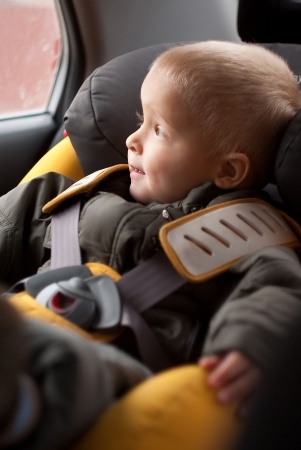 Parents across the country are checking their backseats after Graco issued one of the largest child safety seat recalls in history this week. It may not be the last recall either; the Georgia-based company is facing pressure from the National Highway Traffic Safety Administration (NHTSA) to recall 1.8 million additional seats.
Parents across the country are checking their backseats after Graco issued one of the largest child safety seat recalls in history this week. It may not be the last recall either; the Georgia-based company is facing pressure from the National Highway Traffic Safety Administration (NHTSA) to recall 1.8 million additional seats.
Graco recalled 3.7 million car seats manufactured between 2009 and 2013, the fourth largest recall ever for safety seats and the largest in five years, according to media reports. The NHTSA announced Tuesday that Graco was voluntarily recalling 11 models, though the agency had sought recalls of 18 models. The agency has stated it could take legal action to force the recall of the other models, which are rear-facing models for infants.
The car seats have defective buckles, which can be difficult to unlatch or become stuck. Graco said it was not aware of any injuries resulting from the car seat, but the New York Times reports the NHTSA began investigating Graco in 2012, after parents complained to regulators about having to cut children out of the seats from straps. One parent said it took her 45 minutes to loosen the straps enough to pull her daughter out.
But there is at least one case of serious injury. In a Jan. 14 letter to Graco, the NHTSA noted the company was a defendant in a wrongful death lawsuit in Los Angeles Superior Court in which a two-year-old child was killed in a fire following a car crash. The child was traveling in a Graco Nautilus car seat. The company has said the wrongful death case was resolved by a confidential settlement agreement.
Read the full list of recalled car seats. Parents who have defective car seats can contact Graco for a free replacement buckle. Graco says the seats are safe to use until parents obtain a replacement, but the NHTSA is urging parents to find other seats until they receive the new buckles.
Parents want to be able to trust the car seats, strollers and cribs they use to care for their children. Because these are important purchases, many parents and family members spend time researching and reading consumer reviews on Internet shopping sites such as Amazon.com before purchasing.
These reviews are helpful, as is feedback from other parents. But there are a few other steps parents can take:
Mail in the product registration. You want to make sure the company knows you have its product and need to be notified of any defect or recall and be included in the remedy process.
Do your research. Search the NHTSA database for car seat recalls.
Car seat inspection. Visit this NHTSA website page to search for sites where you can get your car seat inspected. Watch as the certified professional fits your child’s car seat and what to watch as you go about your daily driving routine.
Check your product. Remember a few basics about all children products, from toys to car seats. First, make sure they do not have small parts which can easily break and become a choking hazard. Make sure your child can move freely in seats with straps. Make sure the product can fully support your child by reading the age and weight requirements.
Read More
Attorney David White Discusses Product Recalls on Fox 25 TV
Last weekend, two young children in Franklin tragically died after getting trapped in a defective wooden hope chest during a game of hide and seek. The chest was one of 12 million manufactured by the Lane furniture company of Virginia between 1912 and 1987.
Attorney David White from the Boston product liability firm, Breakstone, White & Gluck, commented on ways consumers can avoid injuries from defective products, including second-hand goods.
According to reports, the Franklin children were probably playing a game when they got into the chest and the lid closed. The lid automatically latched shut when closed and could not be opened from the inside. When the family purchased the second-hand chest 15 years ago, they had no warning of the defect or the fact that the product had been recalled.
Boston News, Weather, Sports | FOX 25 | MyFoxBoston
The chests were recognized as defective after four children were trapped in them and died prior to 1996, leading to a product recall 1997. In 2001, Lane paid a $900,000 civil penalty to the Consumer Product Safety Commission (CPSC) to settle claims that it had provided late notice of the deaths to those four children.
Even after the recall, probably six million of the chests still have the defective locks. Although there have been sporadic efforts to notify the public of this widespread and serious hazard, it is not clear how aggressively Lane has tried to make sure the defective latches are either removed or replaced.
White, a Boston attorney who specializes in injury and liability cases, said companies have a responsibility to inform clients of recalls and stores have a responsibility not to sell recalled products, but sometimes consumers still do not receive notice, including in cases involving products purchased in second-hand stores. He said defective products are causing injury.
White told Fox 25 that the problem is no one registers a hope chest with a company as they would an electronic product such as a new television. His safety tips:
1) Consumers can learn what hazard signs to look for in products and remove unsafe products on their own, even if they have not been recalled.
2) A few products to watch carefully:
- Cribs, car seats, bassinets, strollers and other products which hold babies.
- Products with small pieces that break off.
- Novelty toys with magnets which children can easily swallow. These have been recalled.
3) Consumers can check the CPSC website for recalls.
4) Read age-appropriate labels on toys. Your younger children may not be old enough to play with their older siblings’ toys.
Read More
Household Safety: Check Old Appliances Before Winter
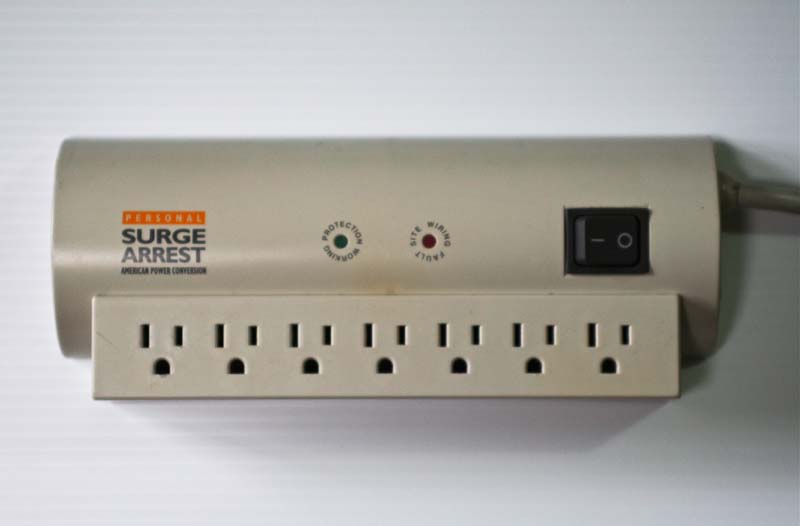 Now, as we head into winter, is a good time to test your home’s smoke alarms, check your appliances and inspect your electrical outlets and cords.
Now, as we head into winter, is a good time to test your home’s smoke alarms, check your appliances and inspect your electrical outlets and cords.
First, a good resource is the Consumer Product Safety Commission (CPSC) website, where you can search for recall news about products you may own. Recently, there have been several recalls involving products posing serious fire hazards.
One example is Schneider Electric IT Corp. recalled 15 million APC Surge Arrest surge protectors in early October. This followed 700 reports of property damage, including $916,000 in fire damage to a home and $750,000 to a medical facility. Another 13 reports were injuries, including smoke inhalation and contact burns. Another example is Gree Electric Dehumidifiers, which recalled 2.2 million dehumidifiers in the U.S. last month, after its products caused 46 fires and $2.15 million in property damage.
You can review the CPSC website to make sure you have no recalled products in your home. You can also take a look around your home for faulty cords or products.
Preventing Home Fires in the Winter
During a typical year, there are over 26,000 home electrical fires in this country, according to the U.S. Fire Administration. December and January see the most electrical fires. We share a few tips for preventing these fires:
1) Check your smoke alarms before the season.
2) Regularly check your electrical appliances and wiring. Replace any old or damaged cords; do not try to repair them.
3) Replace any appliance you feel may not work properly. If you do not want to replace it, call a repair service or visit the store where you purchased the product. Check electric space heaters every year as a rule.
4) Buy appliances which have the label of a recognized testing laboratory, such as UL.
5) Avoid using extension cords.
6) Use only surge protectors or power strips that have internal overload protection and have been tested by a national laboratory.
7) Keep clothes and flammables at least three feet away from all portable electric space heaters.
8) Use light bulbs that match recommended wattages for lamps.
9) Bring in an electrician if you are experiencing flickering lights or other problems.
Related:
Electrical Home Fire Safety, U.S. Fire Administration
Schneider Electric Recalls APC Surge Protectors Due to Fire Hazard, Consumer Product Safety Commission.
Read More
Two Million Dehumidifiers Recalled for Posing Fire Risk
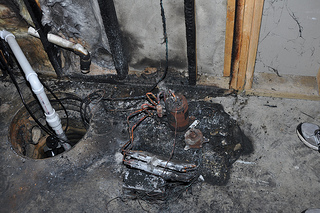 If you own a dehumidifier, there may be a refund heading your way.
If you own a dehumidifier, there may be a refund heading your way.
Last week, 2.2 million dehumidifiers were recalled in the U.S., along with 52,500 units in Canada. The dehumidifiers pose a fire hazard and can overheat, smoke and catch on fire, according to the Consumer Product Safety Commission (CPSC). Consumers are advised to stop using them immediately and contact the manufacturer Gree Electric for a refund.
Gree Electric issued the recall for multiple brand names after receiving 165 incident reports, including 46 fires and $2.15 million in property damage. No injuries have been reported.
The dehumidifiers were sold under these brand names: Danby, De’Longhi, Fedders, Fellini, Frigidaire, Gree, Kenmore, Norpole, Premiere, Seabreeze, SoleusAir and SuperClima. The units sold for $110-$400 in various sizes and colors, from 2005 through last month.
The defective dehumidifiers were sold at Home Depot, Kmart, Lowe’s, Menards, Mills Fleet Farm, Sam’s Club, Sears and other U.S. and Canadian stores. They were also available through Amazon.com.
See a full list of the model numbers and how to obtain a refund.
One of the last major dehumidifier recalls came in 2011. LG Electronics recalled 98,000 Goldstar and Comfort-Aire dehumidifiers after they were linked to fires causing over one million in property damage. A home in Hudson, Mass. sustained $183,000 in fire damage. Homes were also damaged in Pennsylvania, Minnesota, Indiana, Ohio and New Jersey.
The Goldstar and Comfort-Aire dehumidifiers were first recalled in December 2009 following 11 incidents, including four fires. The company re-issued the recall in 2010 and 2011after receiving 16 additional reports of smoke and fire and nine significant fires. No injuries have been reported.
Check Your Home Appliances for Winter
The recall provides a good reminder to check your household appliances for fire hazards before the winter.
1) Make sure your appliance cords are covered and not frayed or ripped anywhere.
2) Check your smoke alarms and carbon monoxide detectors. You should have a smoke alarm in every bedroom and a carbon monoxide detector on every floor.
3) Check the CPSC website. Recently, the CPSC has announced recalls involving floor lamps sold at Target and ceiling lamps. Both products were recalled for posing a fire hazard.
Related:
Home Fires Prompt Dehumidifier Recall Reannouncement from LG Electronics, Consumer Product Safety Commission.
Target Recalls Threshold Floor Lamps Due to Fire and Shock Hazard, Consumer Product Safety Commission.
Ceiling-Mounted Light Fixtures Recalled by Dolan Designs Due to Fire and Shock Hazards, Consumer Product Safety Commission.
(photo credit: Consumer Product Safety Commission flickr)
Read More
Massachusetts Compounding Pharmacy Recalls All 2013 Products
An unannounced inspection at a Massachusetts compounding pharmacy recently uncovered suspicious material on medication containers, leading the operation to order a voluntarily recall for all its 2013 products.
Pallimed Soluitions, Inc. of Woburn issued the recall after the visit from the Food and Drug Administration (FDA) and the Massachusetts Board of Registration in Pharmacy. The agencies found an unknown substance on sterile compounding products. Five affected vials were discovered and no illness has been reported. The recalled drugs include those used for erectile dysfunction treatment, testosterone replacement therapy, vitamin injections and ophthalmic preparations.
The Board of Registration has ordered the pharmacy to halt sterile compounding activities. In December, the compounding pharmacy was among three cited by the state pharmacy board during unannounced inspections. Pallimed was ordered to stop production of sildenafil citrate, which is sold as Viagra. The inspection found the medication was being prepared with improper components.
Medication involved in the recall was shipped to patients and medical offices in Massachusetts, New Hampshire, Rhode Island, Maine, Connecticut, Vermont and 15 other states. Recipients are advised to discontinue use of medications and return to Pallimed Solutions.
The FDA and Massachusetts Board of Registration in Pharmacy share regulation of compounding pharmacies in Massachusetts, which in contrast to large manufacturers, are allowed to dispense medications for individuals with prescriptions, often with conditions which cannot be met in regular pharmacies.
Both agencies are still responding to the aftermath of 2012, when the New England Compounding Center in Framingham was linked to a deadly fungal meningitis outbreak, which sickened over 650 people in 19 states and killed at least 39 others.
In January, Gov. Deval Patrick proposed new licensing requirements for compounding pharmacies, including to let the state assess fines for violating regulations, to protect whistleblowers and reorganize the state pharmacy board.
Along with federal regulations, compounding pharmacies in Massachusetts operate under 247 CMR. Under M.G.L. 94C, section 21 and 105 CMR 721.000, pharmacies and pharmacists must have a prescription for a specific patient before they dispense a medication.
What to Know About Medical Device Recalls
Medical devices are supposed to improve the quality of a patient’s health. When they are surgically implanted, patients expect an extensive recovery and regular medical check-ups. But no patient should expect the medical device to cause new injuries or to be recalled.
Medical devices are supposed to undergo a rigorous approval process with the Food and Drug Administration (FDA) before going on the market, but some screening fails to identify defective devices. Here are some things every patient using a medical device should be aware of regarding product recalls.
Who is Responsible for a Medical Device Recall? The FDA can legally require a company to recall a medical device. In many cases, however, companies recall their own medical devices.
What Does a Recall Mean? A medical device is recalled when it no longer meets FDA requirements. A recall means a medical device is defective, poses a risk to a person’s health, or both.
A recall may mean the device needs to be removed and replaced. It may also mean the device needs repairs or monitoring.
There are three classes of medical device recalls. A Class I Recall is the most serious and indicates there is a reasonable chance the recalled medical device could cause serious illness or even death.
A Class II Recall means a product may cause temporary health problems. A Class III Recall is the least serious type and occurs when the FDA instructs a manufacturer to make a correction that violates FDA regulations.
What is the 510(k) Approval Process? The FDA approves 90 percent of medical devices under the 510(k) process, including many devices which have been recalled in recent years. These include hip implants, external heart defibrillators and transvaginal mesh.
The process – also called Premarket Notification – was designed to bring new treatments to patients faster. Manufacturers must notify the FDA of their intent to market a medical device at least 90 days in advance. Medical device manufacturers are required to submit premarket notification if they plan to introduce a device for the first time or reintroduce a device that will be significantly changed or modified to the extent that its safety could be affected.
How to Learn About a Medical Device Recall. Your doctor or the medical device manufacturer should notify you. You can visit the manufacturer’s website to check for recall notices. The FDA also maintains an online medical recall database. Finally, large medical device recalls may receive media coverage, which may answer some of your questions.
What to Do When a Medical Device Recall Occurs. You can expect to work with the manufacturer as well as your doctor or surgeon.
You should follow your doctor’s advice, except if he or she asks you to sign a form authorizing the release of your medical records before treatment is undertaken. This would allow your physician to release your medical records directly to the manufacturer. It is not in your best interest to sign the release before speaking to an attorney.
Contact a Boston Medical Device Recall Lawyer. If you have a medical device which has caused you injury – or which you suspect has caused you pain and injury – you should contact an experienced Boston product liability lawyer. You may be entitled to file a lawsuit to recover damages for pain and suffering, medical costs and other expenses. You may also be entitled to damages if a loved one has suffered illness or been killed as a result of a defective medical device.
Medical device recalls are debilitating for patients who have often already suffered physical pain. Recall lawsuits are complex. If you have been injured by a defective medical device, Breakstone, White & Gluck has the experience, expertise and resources to obtain you results in your claim.
For a free legal consultation, contact us today toll-free at 800-379-1244 or 617-723-7676 or use our contact form.

